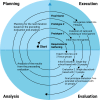Understanding the Importance of Context: A Qualitative Study of a Location-Based Exergame to Enhance School Childrens Physical Activity
- PMID: 27548504
- PMCID: PMC4993470
- DOI: 10.1371/journal.pone.0160927
Understanding the Importance of Context: A Qualitative Study of a Location-Based Exergame to Enhance School Childrens Physical Activity
Abstract
Many public health interventions are less effective than expected in 'real life settings', yet little work is undertaken to understand the reasons why. The effectiveness of complex public health interventions can often be traced back to a robust programme theory (how and why an intervention brings about a change in outcome(s)) and assumptions that are made about the context in which it is implemented. Understanding whether effectiveness (or lack thereof) is due to the intervention or the context is hugely helpful in decisions about whether to a) modify the intervention; b) modify the context; c) stop providing the intervention. Exergames-also known as Active Video Games or AVGS-are video games which use the player's bodily movements as input and have potential to increase physical activity in children. However, the results of a recent pilot randomised controlled trial (RCT) of a location-based exergame (FitQuest) in a school setting were inconclusive; no significant effect was detected for any of the outcome measures. The aim of this study was to explore whether the programme theory for FitQuest was correct with respect to how and why it would change children's perceptions of physical activity (PA) and exercise self-efficacy in the school setting. A further aim was to investigate the features of the school setting (context) that may impact on FitQuest's implementation and effectiveness. Qualitative data (gathered during the RCT) were gathered from interviews with teachers and children, and observation of sessions using FitQuest. Thematic analysis indicated that whilst children enjoyed playing the game, engaged with goal setting within the game context and undertook low to vigorous physical activity, there were significant contextual factors that prevented it from being played as often as intended. These included environmental factors (e.g. size of the playground), school factors (cancellations due to other activities), school technology policy (rules relating to mobile phone usage) and teacher factors (engagement with the intervention). A revised logic model for the FitQuest intervention indicates how both the design of exergame technology (intervention) and features of the school environment (context) could be improved to increase chances of effectiveness in the future.
Conflict of interest statement
AM designed the software which is evaluated in this article; SG implemented the design. This does not alter our adherence to PLOS ONE policies on sharing data and materials.
Figures
Similar articles
-
Promoting physical activity with a school-based dance mat exergaming intervention: qualitative findings from a natural experiment.BMC Public Health. 2016 Jul 20;16:609. doi: 10.1186/s12889-016-3308-2. BMC Public Health. 2016. PMID: 27440200 Free PMC article.
-
A Randomized-Controlled Trial of School-Based Active Videogame Intervention on Chinese Children's Aerobic Fitness, Physical Activity Level, and Psychological Correlates.Games Health J. 2016 Dec;5(6):405-412. doi: 10.1089/g4h.2016.0057. Epub 2016 Nov 17. Games Health J. 2016. PMID: 27855265 Clinical Trial.
-
An Internet-supported Physical Activity Intervention Delivered in Secondary Schools Located in Low Socio-economic Status Communities: Study Protocol for the Activity and Motivation in Physical Education (AMPED) Cluster Randomized Controlled Trial.BMC Public Health. 2016 Jan 6;16:17. doi: 10.1186/s12889-015-2583-7. BMC Public Health. 2016. PMID: 26740092 Free PMC article. Clinical Trial.
-
Effects of active video games on physical activity among overweight and obese college students: a systematic review.Front Public Health. 2024 Feb 13;12:1320112. doi: 10.3389/fpubh.2024.1320112. eCollection 2024. Front Public Health. 2024. PMID: 38420024 Free PMC article.
-
Physical activity interventions in European primary schools: a scoping review to create a framework for the design of tailored interventions in European countries.Front Public Health. 2024 Feb 8;12:1321167. doi: 10.3389/fpubh.2024.1321167. eCollection 2024. Front Public Health. 2024. PMID: 38389941 Free PMC article.
Cited by
-
Analysis of the applicability and utility of a gamified didactics with exergames at primary schools: Qualitative findings from a natural experiment.PLoS One. 2020 Apr 10;15(4):e0231269. doi: 10.1371/journal.pone.0231269. eCollection 2020. PLoS One. 2020. PMID: 32275688 Free PMC article.
-
[Digital Applications in the Planning and Implementation of Structural Health Promotion and Prevention Settings: Results of a Scoping Review].Gesundheitswesen. 2023 Apr;85(4):380-387. doi: 10.1055/a-1757-9264. Epub 2022 Jun 23. Gesundheitswesen. 2023. PMID: 35738302 Free PMC article. German.
-
Mobile Exergaming in Adolescents' Everyday Life-Contextual Design of Where, When, with Whom, and How: The SmartLife Case.Int J Environ Res Public Health. 2018 Apr 24;15(5):835. doi: 10.3390/ijerph15050835. Int J Environ Res Public Health. 2018. PMID: 29695069 Free PMC article.
-
Digital Health Promotion and Prevention in Settings: Scoping Review.J Med Internet Res. 2022 Jan 28;24(1):e21063. doi: 10.2196/21063. J Med Internet Res. 2022. PMID: 35089140 Free PMC article.
-
Exergames in Childhood Obesity Treatment: A Systematic Review.Int J Environ Res Public Health. 2021 May 6;18(9):4938. doi: 10.3390/ijerph18094938. Int J Environ Res Public Health. 2021. PMID: 34066369 Free PMC article.
References
-
- Blair SN. Physical inactivity: the biggest public health problem of the 21st century. Br J Sports Med. 2009;43: 1–2. - PubMed
-
- World Health Organization. Physical activity: Fact sheet N°385. 2015.
-
- Currie C, Zanottie C, Morgan A, Currie D, De Looze M, Roberts C, et al. Social determinants of health and well-being among young people. Health Behaviour in School-aged Children (HSBC) study: international report from the 2009/2010 study. Copenhagen; 2010.
-
- Department of Health Physical Activity and Health Improvement. Start Active, Stay Active: A report on physical activity for health from the four home countries’ Chief Medical Officers. London; 2011.
-
- The Parliamentary Office of Science and Technology. PostNote 405: Impacts of Video Games. London; 2012.
MeSH terms
LinkOut - more resources
Full Text Sources
Other Literature Sources
Medical




